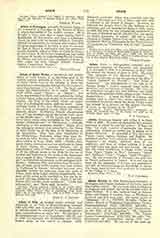

Adam, JOHN, a distinguished preacher and a strenuous opponent of Calvinists and Jansenists, b. at Limoges in 1608; d. at Bordeaux, May 12, 1684. He entered the Society of Jesus in 1622. He wrote “The Triumph of the Blessed Eucharist“; “A Week’s Controversy on the Sacrament of the Altar”; “Calvin Defeated by Himself”; “The Tomb of Jansenism”; “An Abridgement of the Life of St. Francis Borgia”; Lenten sermons; some books of devotion; and translations of hymns. His views on St. Augustine brought him into collision with Cardinal Noris who attacked Father Adam in his “Vindiciae Augustinianae”. A book by Noel de Lalanne also assailed what is called” the errors, calumnies, and scandalous invectives which the Jesuit Father Adam has uttered in a sermon, on the second Thursday of Lent, in the Church of St. Paul.”
T. J. CAMPBELL

